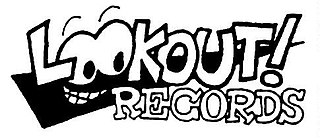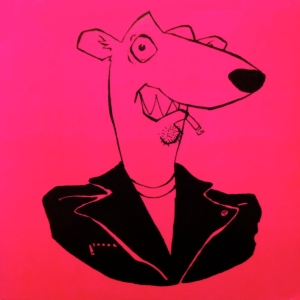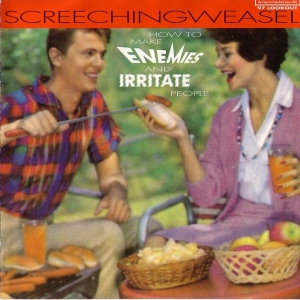
Lookout Records was an independent record label, initially based in Laytonville, California and later in Berkeley, focusing on punk rock. Established in 1987, the label is best known for having released Operation Ivy’s only album, Energy, and Green Day's first two albums, 39/Smooth and Kerplunk.
Screeching Weasel is an American punk rock band consisting of Ben Weasel (vocals), Trevor Jackson (guitar), Mike Hunchback (guitar), Zach "Poutine" Brandner (bass) and Pierre Marche (drums). Screeching Weasel is originally from the Chicago suburb of Prospect Heights, Illinois. The band was formed in 1986 by Ben Weasel and John Jughead. Since their formation, Screeching Weasel have reformed several times with line-up changes. Ben Weasel has been the only constant member, though Jughead was present in every incarnation of the band until 2009. Other prominent members include guitarist/bassist Dan Vapid and drummer Dan Panic, who have each appeared on six of the band's studio albums, and Green Day bassist Mike Dirnt who was briefly a member of the band.

The Queers are an American punk rock band, formed in 1981 by the Portsmouth, New Hampshire native Joe P. King along with Scott Gildersleeve, and Jack Hayes. With the addition of Keith Hages in 1982 the band started playing their first live shows. The band originally broke up in late 1984, but reformed with Joe Queer and a new line-up in 1986. In 1990, the band signed with Shakin' Street Records and released their first album Grow Up. The album earned the band notability within New England, but with the release of their next album 1993's Love Songs for the Retarded, on Lookout! Records, their following grew larger.
The Lillingtons were a pop punk band formed in 1996 in Newcastle, Wyoming. The band is composed of vocalist and lead guitarist Kody Templeman, guitarist Alex Volonino, bassist Cory Laurence, and drummer Tim O'Hara.

Massimiliano Adelmo "Mass" Giorgini is an Italian-American bassist and record producer, who rose to fame when several of the bands he produced experienced huge gains in popularity during the pop-punk boom on the mid-‘90s. Among these bands was Giorgini's own Squirtgun, which received minor MTV rotation and several soundtrack appearances in major films in the 1990s. Mass Giorgini is also the son of renowned Italian artist Aldo Giorgini.
Squirtgun is an American punk rock band from Lafayette, Indiana formed by record producer Mass Giorgini in 1993.
Chris Appelgren, also known as Chris Applecore, was owner and president of Lookout! Records from, 1997 when label founder Larry Livermore and partner Patrick Hynes retired, until 2012 when the label folded due to financial troubles and non-payment of royalties. In addition, Appelgren has created original artwork and album designs for many punk bands including Blatz, Green Day, Screeching Weasel, The Queers, The Donnas, and Ted Leo and the Pharmacists.

Boogadaboogadaboogada! is the second studio album by the Chicago-based punk rock band Screeching Weasel. The album was originally released on vinyl in December 1988 through Roadkill Records. It was the group's only album to feature Fish on bass and the last with Steve Cheese on drums, both leaving the band shortly after the album's release. Although still influenced by hardcore punk, the album also shows hints of the band's later Ramones-inspired sound.

My Brain Hurts is the third studio album by the Chicago-based punk rock band Screeching Weasel. The album was originally released on CD, vinyl and cassette in September 1991 through Lookout Records. It was the group's first album on Lookout as well as the only release with bassist Dave Naked and the first with drummer Dan Panic, the latter of which would go on to appear on several of the band's albums. The album marked a very distinct stylistic shift for the group, fully moving toward a Ramones-inspired sound and completely abandoning their previous hardcore punk influences as a condition made by vocalist Ben Weasel when reforming the band after a brief break-up.

Wiggle is the fifth studio album by the Chicago-based punk rock band Screeching Weasel. Initially planned for release in November 1992, the album was finally released on CD, vinyl and cassette on January 15, 1993 through Lookout Records. Due to a "cymbal hissing" in the original vinyl version, the album was remixed and re-released soon afterwards.

How to Make Enemies and Irritate People is the seventh studio album by the Chicago-based punk rock band Screeching Weasel. Planned as the group's final album, it was released in August 1994 on CD, vinyl and cassette through Lookout Records. Shortly before recording the album, bassist/backing vocalist Dan Vapid left the band and, as a result, Green Day bassist Mike Dirnt was recruited to play on the album.

Screeching Weasel is the self-titled debut studio album by the Chicago-based punk rock band Screeching Weasel. It was originally released on vinyl with a limited pressing of 1,000 copies in September 1987 through local independent label Underdog Records and was the band's only album with bassist Vinnie Bovine, who was fired the next year. Screeching Weasel documents the group's early years as a hardcore punk band, with the music being heavily influenced by bands such as Adrenalin O.D., Angry Samoans, Circle Jerks and Black Flag.

Grow Up is the debut album by the American punk rock band the Queers. Recorded in multiple sessions between 1986 and 1988, with various band members and session musicians backing singer and guitarist Joe King, it was originally released as an LP record in 1990 by British label Shakin' Street Records. However, the label went out of business after only 1,000 copies were pressed. The Queers had more copies pressed themselves, continuing to list Shakin' Street as the record label, but when they failed to pay their bill the pressing plant destroyed all but approximately 160 copies, which the band released with a photocopied album cover.

Beat Off is the fourth studio album by the American punk rock band the Queers, released in 1994 by Lookout! Records. Recorded during a time when the Queers' usual drummer, Hugh O'Neill, was on a forced leave of absence from the band to deal with heroin addiction, it featured Screeching Weasel drummer Dan Panic and guitarist Dan Vapid added to the lineup. It was the third and final Queers album produced by Screeching Weasel singer Ben Weasel, who insisted on a no-frills punk sound for the album and removed Vapid's tracks from the final mix without his knowledge.

Move Back Home is the fifth studio album by the American punk rock band the Queers, released in May 1995 by Lookout! Records. The recording sessions were marred by the band members' drug problems, and many of the songs were written in the studio. Producer and Lookout! president Larry Livermore was so displeased with the result that he took his name off of the album, and several involved parties, including singer and guitarist Joe Queer, later regarded it as sub-par. After the Queers rescinded their master recordings from Lookout! in 2006, Move Back Home was reissued by Asian Man Records the following year, having been remixed and remastered by Queer and recording engineer Mass Giorgini and with the tracks from the Surf Goddess EP added.

A Day Late And A Dollar Short is a compilation album by the American punk rock band the Queers, released in January 1996 by Lookout! Records. It collects material recorded between 1982 and 1994, most of it with original member Wimpy Rutherford. It includes the band's first two EPs, 1982's Love Me and 1984's Kicked Out of the Webelos, several demo tracks recorded in 1991, 16 tracks recorded during a January 1993 reunion with Rutherford, and a complete set of early songs recorded live on radio station WFMU in 1994 with Rutherford on lead vocals.

Surf Goddess is an EP by the American punk rock band the Queers, released in February 1995 by Lookout! Records. It marked the return of longtime drummer Hugh O'Neill to the band, after a forced leave of absence to deal with heroin addiction. Former Screeching Weasel member Dan Vapid, who had been a member of the Queers in 1994, played on the EP as a guest guitarist. Surf Goddess was the result of band leader Joe King and Lookout! head Larry Livermore being dissatisfied with the production techniques on the band's prior album, 1994's Beat Off, which producer Ben Weasel had insisted on keeping basic. King and Livermore wanted to incorporate overdubbing and other effects which Livermore felt were essential to the Queers' sound. In addition to the title track, which was co-written by Weasel, and the Queers original "Quit Talkin'", the EP includes cover versions of Tommy James and the Shondells's "Mirage" and the Undertones' "Get Over You".

Don't Back Down is the sixth studio album by the American punk rock band the Queers, released in August 1996 by Lookout! Records. The band and Lookout! president Larry Livermore, who served as executive producer, sought to balance the sounds of the Ramones and the Beach Boys, and enlisted the help of former Queers guitarist JJ Rassler and Cub singer Lisa Marr. The album's title track is a cover version of the Beach Boys song of the same name; it also features covers of the Hondells' "Little Sidewalk Surfer Girl" and Hawaiian punk band the Catalogs' "Another Girl". The album produced the band's first music videos, for "Punk Rock Girls" and "Don't Back Down".

Suck This is the second live album by the American punk rock band the Queers, released in 1995 by independent record label Clearview Records. It was recorded live in the studio at the Jam Room in Columbia, South Carolina and released as a single-sided picture disc, and reissued on compact disc in 1998. It was the band's only live album recorded during the period when Screeching Weasel members Dan Vapid and Dan Panic were also in the Queers.
Between 1993 and 2000, a series of Ramones covers albums were released by Selfless Records, an independent record label based in Garland, Texas specializing in punk rock, on which bands influenced by seminal punk group the Ramones performed cover versions of entire Ramones albums. Under the Selfless label, Screeching Weasel, the Queers, and the Vindictives respectively covered the first three Ramones albums: Ramones (1976), Rocket to Russia (1977), and Leave Home (1977). Selfless then became Clearview Records and continued the series, with Boris the Sprinkler, the Parasites, the Mr. T Experience, the Beatnik Termites, and the McRackins respectively covering End of the Century (1980), It's Alive (1979), Road to Ruin (1978), Pleasant Dreams (1981), and Too Tough to Die (1984).
















